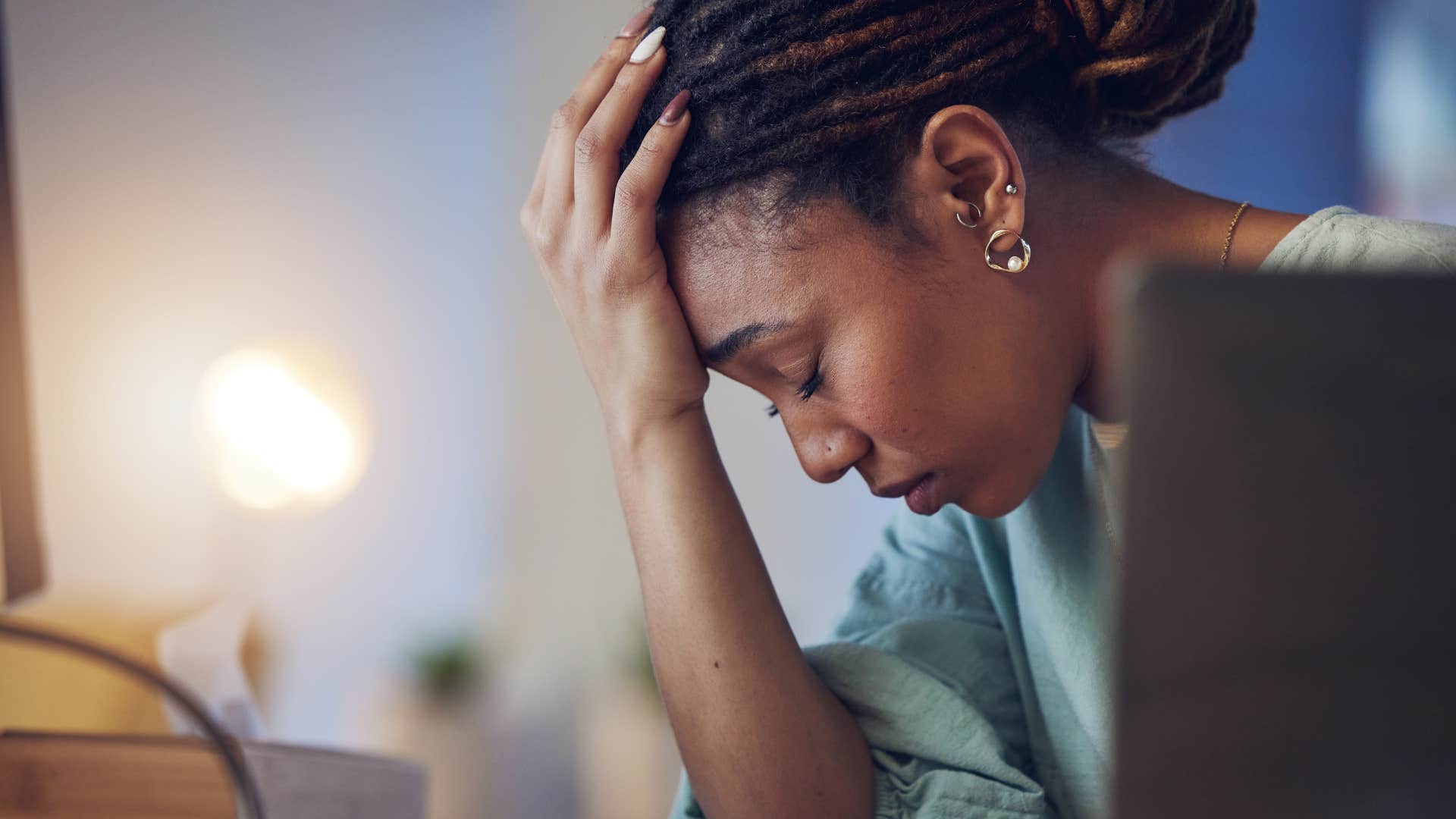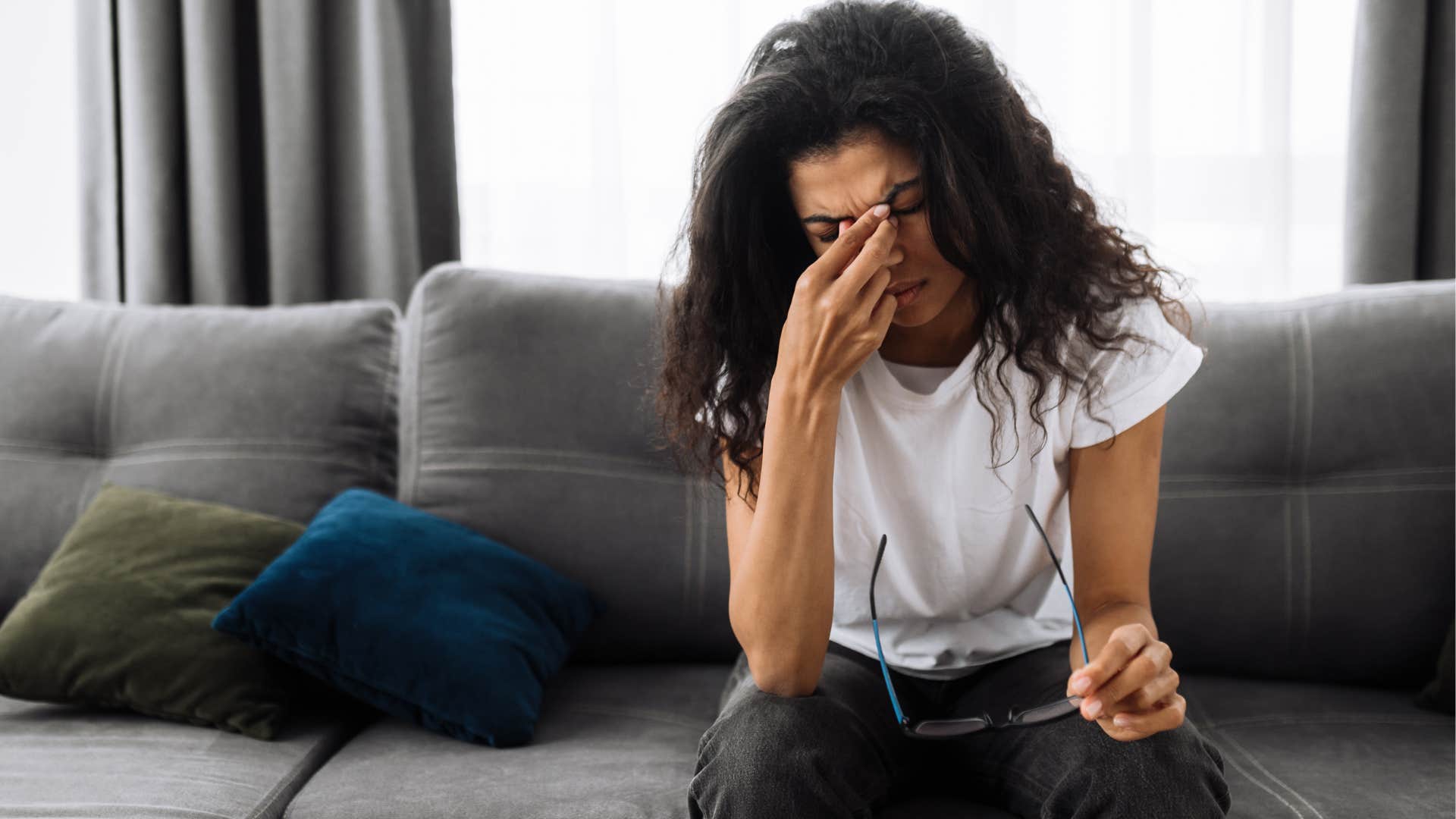People Who Feel Disconnected & Alone Even In A Room Of People Usually Have These 11 Reasons
We're facing an epidemic of loneliness, and many people are grappling with the consequences.
 fizkes / Shutterstock
fizkes / Shutterstock For several years now, we've been hearing that there is an epidemic of loneliness in our country, largely caused by a lack of real life community. As we grapple with what to do about this painful issue, there are many people who feel disconnected and alone even in a room of people, and they share some common reasons.
Whether they are spending too much time on social media, have cut ties with family, or struggling with anxiety and other mental health conditions, these people feel as though they are truly alone, even when they are in the company of others. And the majority of these people are fairly young, with over 50% falling into the age range of 18-44 years old. By acknowledging and facing the reasons for their loneliness, it may be possible to address the role social connectedness plays in their lives and modify the behaviors that seem to be consistently preventing them them from building meaningful connections.
People who feel disconnected and alone even in a room of people usually have these 11 reasons
1. They struggle with self-doubt
 PeopleImages.com - Yuri A | Shutterstock.com
PeopleImages.com - Yuri A | Shutterstock.com
People struggling with insecurity tend to live completely in their heads, worried about how other people perceive them and if they’re being judged. Because of this, they may isolate themselves from meaningful conversations and connections in public. Even in a room full of people, they often feel disconnected and alone.
A study published in the Journal of Affective Disorders found an association between insecurity and emotional wellbeing. When we struggle with low self-esteem or self-worth, our brain overcompensates, manifesting in mental health issues like depression or anxiety.
2. They’re missing meaningful connections
 Voronaman | Shutterstock.com
Voronaman | Shutterstock.com
Even when in a room full of friends, people may feel disconnected and alone when they’re not harboring deep emotional connections. Instead, they have superficial interactions, talking about random things, avoiding vulnerability, and lacking the foundational trust and communication skills needed to sustain something more meaningful.
Deep and meaningful connections don’t just provide us with opportunities for personal growth and happiness, they help us to live longer and healthier lives. When we miss out on those connections and remain stuck in a cycle of small talk and resentment, we’re subtly isolating ourselves and failing to reap the benefits of more significant social interaction.
3. They’ve outgrown their friends
 Inside Creative House | Shutterstock.com
Inside Creative House | Shutterstock.com
Even if you do have deep or meaningful connections with your friends and peers, chances are you’ve outgrown them if you’re still feeling alone in their presence. Especially if you’ve had difficult conversations, set boundaries, and expressed your needs already, only to continually feel disrespected or unheard, it could be time to move on.
It’s human nature to drift apart from friends over time because we all change. Our priorities shift, our beliefs and values change, and the relationships that one served us may no longer be as influential in shaping the rest of our lives. When you don’t feel heard or understood by the people who are supposed to be the most supportive, it can feel isolating, draining, and endlessly frustrating.
4. They’re navigating change
 Kateryna Onyshchuk | Shutterstock.com
Kateryna Onyshchuk | Shutterstock.com
According to experts from the Lukin Center for Psychotherapy, life changes and unexpected shifts in a daily routine can cause stress and emotional turmoil, even in the most intelligent and resilient people. When we’re navigating change, we often have little space to focus on other things, because our lives shift alongside life events. Our relationships shift, our identities change, and our priorities in life look different in the face of adversity or unexpected change.
The kind of emotional turmoil and sometimes anxiety that manifests in these periods in our lives can feel isolating. People who feel disconnected and alone even in a room of people are often so focused on figuring out their own life and dealing with change and adversity that they don’t have the capacity for more social interaction.
5. They’re exhausted
 Kateryna Onyshchuk | Shutterstock.com
Kateryna Onyshchuk | Shutterstock.com
The effects of burnout, whether it’s caused by long hours at work or overwhelming responsibilities and obligations at home, often manifest as fatigue, physical exhaustion, and fogginess. When our brains are so overloaded trying to compensate for burnout, we have less space to exert in things like social connection or taking care of ourselves with a healthy routine.
People who feel disconnected and alone even in a room of people are often exhausted and burned out. They struggle to recharge and relax in ways that stimulate social connection and interaction.
6. They’re anxious
 EugeneEdge | Shutterstock.com
EugeneEdge | Shutterstock.com
Whether it’s social anxiety or a diagnosed mental illness like an anxiety disorder, people grappling with anxious thoughts and overthinking tendencies may feel more disconnected from others in a social situation. They’re often stuck in a “fight-or-flight” mode, overthinking their actions, trying to protect themselves from perceived threats, and subtly self-isolating.
According to psychiatrist Steven Gans, this kind of anxiety often manifests as worry. They may be worried about external judgment, other people’s opinions, or how we’re being perceived in social interactions rather than just connecting and living in the moment.
7. They have a toxic partner
 PeopleImages.com - Yuri A | Shutterstock.com
PeopleImages.com - Yuri A | Shutterstock.com
Oftentimes, toxic partners will intentionally isolate their victims through emotional manipulation and misbehavior that keeps them from finding support in others. People are easier to take advantage of when they don’t have a circle of friends or family members trying to hear them out or give them advice.
People who feel disconnected and alone even in a room of people may be struggling with this. They feel a sense of loyalty or obligation to their toxic partner, often sparked by gaslighting or manipulative behaviors, so they drift away from friends and avoid splitting their time between new connections.
8. They’re grieving
 Pressmaster | Shutterstock.com
Pressmaster | Shutterstock.com
Grief can erupt even in the most unsuspecting moments, like when we’re having a conversation with a stranger at a grocery store or unwinding after work at home. It feels all-consuming, yet we often face a pressure to act normal and persevere for the sake of everyone else’s comfort.
People who are grappling with a loss or grieving may feel more alone than usual, even in a room full of people, because they don’t feel understood or empathized with. Their grief encapsulates every interaction, thought, emotion, and conversation, but it seems like they’re the only one who truly understands the depth and severity of their struggles.
9. They’re introverts
 MAYA LAB | Shutterstock.com
MAYA LAB | Shutterstock.com
According to the author of “The Introvert’s Way,” Sophia Dembling, introverted people do tend to take more time to themselves, recharging their social battery in solitude and acknowledging their emotions outside of social contexts, while extroverted people do the opposite. Not only can extroverted people recharge their energy levels by interacting with others, they tend to find community, deeper connection, and strong relationships faster because of this heightened exposure to conversations and interactions.
Introverted people may feel disconnected and alone in a room full of people, overwhelmed by societal pressures to mingle and fit in. Especially in the face of strong emotions, conflict, or anxiety, it can feel even more difficult for introverted people to cope with social interaction, considering they usually utilize solitude to regulate their emotions and unpack their feelings.
10. They try too hard to fit in
 Fizkes | Shutterstock.com
Fizkes | Shutterstock.com
People are inherently drawn to authenticity, according to a study published in the Personality and Individual Differences journal, which is why people who are trying too hard to fit in or mold with a group often feel more isolated and lonely even when they’re in a room full of people.
Self-doubt and insecurity often manifests in this way, pressuring people to adopt trends and societal standards without carving out space for self discovery or their own authentic identity.
11. They’re perfectionists
 PeopleImages.com - Yuri A | Shutterstock.com
PeopleImages.com - Yuri A | Shutterstock.com
According to a study published in the Journal of Social and Clinical Psychology, people with perfectionist tendencies tend to experience social isolation, depression, and loneliness at much higher rates than their counterparts who don’t. They feel internal emotional turmoil, coupled with social pressure, that makes any casual interaction more anxiety-inducing than it’s worth.
Even in a room of people, these perfectionists tend to feel disconnected and alone, struggling with overthinking, self-doubt, and a cycle of disappointment that their unrealistic expectations for themselves and others promote.
Zayda Slabbekoorn is a staff writer with a bachelor’s degree in social relations & policy and gender studies who focuses on psychology, relationships, self-help, and human interest stories.

